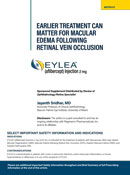The Office of Inspector General (OIG) last year cast a pall over ophthalmologists in general and retina specialists in particular. An OIG report focused on questionable Medicare billing practices among ophthalmologists for two diagnoses—age related macular degeneration and cataracts.1
Essentially, the OIG recommended the Center for Medicare & Medicaid Services step up it’s monitoring of ophthalmologists, and then initiated audits against several retina practices.
Using that scenario as a backdrop, John Thompson, MD, of Retina Specialists, a three-office practice in Maryland, described at the 34th annual meeting of the American Society of Retina Specialists the society’s benchmarking program, called Retina PractiCare, to help members monitor and track their coding habits.
Closing the Data Gap
“The use of big data against physicians is allowing Medicare and insurers to troll claims data to identify what they call ‘high-cost physicians’ and to punish them,” Dr. Thompson said. “The combination of this physician profiling, payer reviews and uncertainty around appropriate billing practices has resulted in an inequitable environment for physicians, and physicians lack to the data to determine if they are outliers and likely to attract the attention of auditors.”
Retina PractiCare aims to close that data gap. ASRS members who sign up can see how their claims patterns compare with not only peers in the same region and around the country, but also with partners in their own practices. Retina PractiCare does not identify participating physicians and practices except to fellow physicians in the same practice. “Large practices in a region don’t have to fear they’ll be identified,” Dr. Thompson said.
Retina PractiCare securely downloads anonymized data from Medicare 1500 forms and aggregates the data with other retina specialists. All protected health information is removed before the data uploads to the Retina PractiCare servers.
The system is HIPAA compliant and protected health information does not leave the physician’s server. “It will tell you if your practice is an outlier and you are at great risk of audit or terminations; or perhaps your practice is too conservative and you’re not being reimbursed fairly for what you deserve,” Dr. Thompson said.
Telling Trends in Coding
As of the ASRS meeting last month, 327 retina specialists from 62 practices have signed up for Retina PractiCare with “several million individual claims” in the database, Dr. Thompson said.
The data collected so far provides a picture of how retina specialists bill, and has shown some telling disparities, Dr. Thompson noted.
“The most common procedure performed by a retina specialist is an optical coherence tomography (92134) in over 40 percent of all office visits, followed by intravitreal injection (67028) in over 25 percent of office visits and level 2 return patient eye exam (92012) in 25 percent of claims,” he said. “There are substantial variations in coding practices by individual retina specialists.”
Some retina specialists use exclusively level 5 Evaluation & Management codes for all returning patients, while most use the eye codes because the reimbursement is better. Some practices uses the -25 modifier more than 80 percent of the time for intravitreal injections; others rarely use it.
Variations Within a Group
Dr. Thompson also shared tracking data of a group practice that showed wide variability among its own doctors’ submitted claims. “This group can’t seem to agree on using the -25 modifiers,” he said. “We have different members of this group using the -25 modifier with intravitreal injection from 5 percent to 90 percent of the time,” he said.
Likewise, surgery codes for retinal detachment vary. Dr. Thompson showed an example of a physician who bills complex retinal detachment for every RD case, while another does of mix of pneumatic retinectomies, vitrectomies and a few complex RDs. Another physician does extended ophthalmoscopy in 90 percent of exams while others rarely use it.
Dr. Thompson said Retina PractiCare has already had an impact in his practice. “It has changed the way I do some billing. I realize I was too aggressive in some areas and too conservative in other areas.”
A little tweaking can help keep those auditors away. RS
REFERENCE
1. Murtin S. Questionable Billing for Medicare Ophthalmology Services. Department of Health and Human Services; Office of Inspector General. Washington, DC. September 2015. https://oig.hhs.gov/oei/reports/oei-04-12-00280.pdf. Accessed August 30, 2016.
Benchmarking Tool Can Track Coding
Retina PractiCare tool can show how your claims compare with peers’—and maybe help keep auditors away.
Edited by Kari Rasmussen



